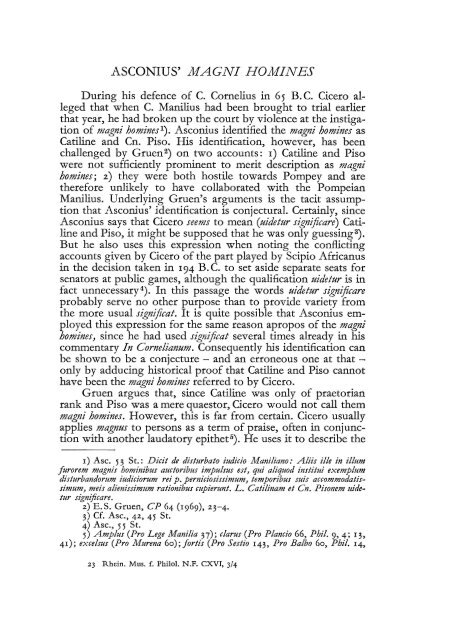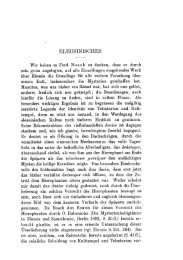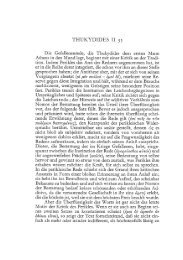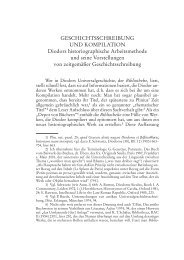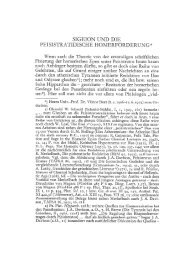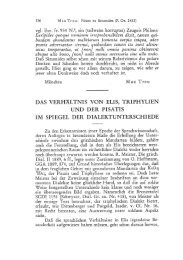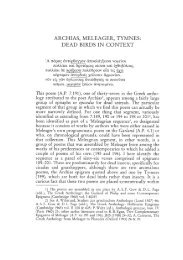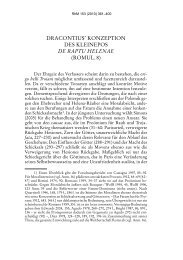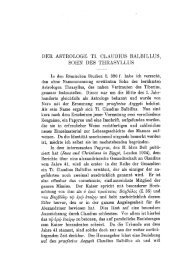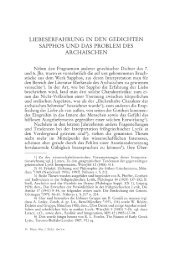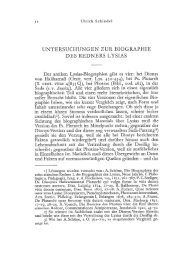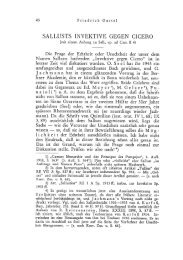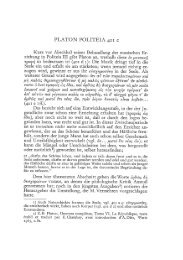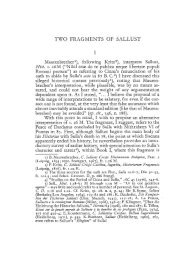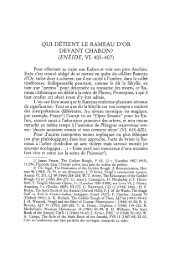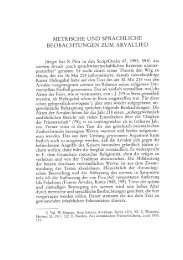You also want an ePaper? Increase the reach of your titles
YUMPU automatically turns print PDFs into web optimized ePapers that Google loves.
<strong>ASCONIUS'</strong> <strong>MAGNI</strong> <strong>HOMINES</strong><br />
During Ws defence of C. Cornelius in 65 B.C. Cicero althat<br />
C. Manilius had been brought to trial earlier<br />
year, he had broken up the court by violence at the instigation<br />
of magni homines l ). Ascomus identified the magni homines as<br />
Catiline and Cn. Piso. His identification, however, has been<br />
challenged by Gruen 2 ) on two accounts: r) Catiline Piso<br />
were not sufficiently prominent to description as magni<br />
homines; 2) they were both hostUe towards Pompey and are<br />
therefore unlike1y to have collaborated with the Pompeian<br />
Mamlius. Underlying Gruen's arguments is the tacit assumpdon<br />
that Ascomus' identification is conjecturaL Certainly, since<br />
Asconius says that Cicero seems to mean (uidetur signijicare) Catiline<br />
and Piso, it might be supposed that he was only guessing 3 ).<br />
But he also uses this expression when noting the conflicting<br />
accounts given by Cicero ofthe part played by Seipio Africanus<br />
in the decision taken in r94 B.C. to set aside separate seats for<br />
senators at public games, although the qualification uidetur is in<br />
fact unnecessary4). In tWs passage the words uidetur signijicare<br />
probably serve no other purpose than to provide variety from<br />
the more usual signijicat. It is quite possible Ascomus employed<br />
this expression for the same reason apropos of the magni<br />
homines, he had used signijicat several times already in his<br />
commentary In Consequently Ws identificadon can<br />
shown to a conjecture and an erroneous one at that -<br />
only by addudng historical proof that Catiline and Piso cannot<br />
have been the magni homines referred to by Cicero.<br />
Gruen argues that, since Catiline was only of praetorian<br />
rank and Piso was a mere quaestor, Cicero would not call them<br />
magni homines. However, this is far from certain. Cicero usually<br />
applies magnus to persons as a term of praise, often in conjuncdon<br />
with another laudatory epithet 5 ). He uses it to describe the<br />
I) Ase. ) 3 St.: Dieit de disturbato iudicio ManiJiano: Aliis ille in il/um<br />
/urorem magnis hominibus auetoribus impulsus est, qui a/iquod institut exemplum<br />
disturbandorum iudieiorum ret p. pernieiosissimum, temporibus suis accommodatissimum,<br />
meis a/ienissimum rationibus cupierunt. L. Catilinam et Cn. Pisonem uidetur<br />
signijicare.<br />
2) E. S. CP 64 (1969), 23-4.<br />
3) Cf. 42,45 St.<br />
4) Ase., 55 St.<br />
5) Amplus (Pro Manilia H); c/ayus (Pro P/aneio 66, Phil. 9,4; 13,<br />
exeelsus (Pro Murena 60);/ortis (Pro Sestio 143, Pro Balbo 60, Phil. 14,<br />
23 Rhein. Mus. f. Philol. N.F. CXVI. 3/4
354<br />
E. J. Phillips<br />
general greatness of Cn. Octavius (cos. 16) Re.) and Decimus<br />
Brutus, as weIl as, more specifically, the moral excellence of<br />
Cato the Younger 6 ). His most frequent use of magnus is in<br />
generalisations, where a magnus homo is in effect a conservative,<br />
a bonus. He seldom employs it in an unfavourable context, but a<br />
dose parallel to the passage in the Pro Cornelio occurs in the<br />
Verrine Orations) where he mentions the friendship of Hortensius<br />
and other hominum llJagnorum atque nobiliu1JJ enjoyed by Verres<br />
7). Obviously his use of magnus in generalisations has no<br />
bearing on its application in the Pro Cornelio and the remaining<br />
examples are too few and imprecise to establish what other<br />
characteristics, if any, he regarded as essential to a magnus homo.<br />
But it is dear that magnus was not a particularly strong word in<br />
Cicero's vocabulary; it was not one of his favourite or most<br />
colourful epithets and, when he did employ it, he usually feIt the<br />
need to reinforce it with another adjective. When tbis is considered<br />
together with the fact that exaggeration is a regular<br />
feature of oratory, it will be reaHsed that in the context of a<br />
speech the term magnus homo need not necessarily denote a really<br />
outstanding public figure. Gruen assumes that Cicero's use<br />
of magnus depended entirely on rank. If so, since Decimus<br />
Brutus was only an ex-praetor, Catiline would qualify as a<br />
magnus homo. But undue emphasis must not be placed on the<br />
formality of rank. Not only is there no indication that Cicero's<br />
use of magnus was governed solely by considerations of rank,<br />
but it must be remembered that power and rank did not automatically<br />
go hand in hand. Some politicians, such as Caesar and<br />
Cato the Younger were able at an early age to exercise an influence<br />
out of all proportion to their rank and conversely some<br />
consulars like L. Volcacius Tullus made little impression on<br />
politics. Nor must Catiline's ownimportance be under-estimated.<br />
Not only was he a patrician who numbered prominent nobiJes<br />
among bis amid) but he had areputation as a man of abundant<br />
energy and must naturally have attracted attention as a prospective<br />
candidate for the consulship8). Ofthe young noble Cn. Piso<br />
little is known, but his attack on Pompey in the law courts won<br />
bim sufficient notoriety to merit a reference in Valerius Maxi-<br />
3); grauis (Pro Sestio 105); persapiens (Prov. Cons. 44); sapiens (Pro Cluentio<br />
159)·<br />
6) Ge., Pro Murena 60.<br />
7) Ge., Verr. 2, 3,7.<br />
8) For Catiline's eharaeter see SaH., Cat. 5, 1-5.
Aseonius' magni homines<br />
mus 9) and he was regarded by the Senate as a suitable choice<br />
for an extraordinary appointment as quaestor pro praetore in<br />
Hither Spain10). Asconius' description of him as a leading<br />
trouble maker ll ), ifnot entirely a flction derived from maHcious<br />
propaganda, gives the impression that he was an influential activist<br />
in Roman politics.<br />
The possibility that Cicero might describe Catiline and Piso<br />
as magni homines cannot therefore be discounted, but were they<br />
suitable allies for Manilius? Gruen has emphasized the anti<br />
Pompeian aspects of Catiline. Catulus 12) and Cn. Piso, both<br />
enemies of Pompey, were among his friends and in 64 B. C. he<br />
was prosecuted by L. Lucceius13), a supporter of Pompey, for<br />
bis crimes under the Sullan regime. Seager 14 ), on the other hand,<br />
has stressed Catiline's Pompeian connections. Catiline appears<br />
to have served under Pompeius Strabo in the Sodal War 15 ); he<br />
escaped expulsion from the Senate in 70 B.c., despite his Sullan<br />
crimes, and in 65 B.C. was defended at his trial for extortion<br />
by the Pompeian consul L. ManHus Torquatus. Moreover, it<br />
must be remembered that he was seeking election to the consulship.<br />
As the Commentariolum Petitionis makes abundantly<br />
clear, it was essential for a candidate to muster support from<br />
whatever quarter he could and the backing of the popular extribune<br />
Manilius would be an invaluable asset to Catiline. His<br />
enmity towards Cicero 16 ) may have resulted in bis losing the<br />
support of persons friendly to Cicero and Pompey alike and<br />
being prosecuted after the consular elections of 64 B. C. by<br />
Lucceius. Cn. Piso had areputation as an enemy of Pompey. It<br />
was claimed that thanks to the influence of Crassus he was sent<br />
by the Senate to Spain in order to act as a counterweight to<br />
Pompey's power in the East 17 ); but the Calpurnii Pisones had a<br />
9) Val. Max., 6, 24.<br />
10) ILS 875. ].P.V.D. Balsdon,fRS 52 (1962),134-5, argues that<br />
Piso's appointment was not extraordinary, but Spain was far more important<br />
than the parallels cited.<br />
II) Ase., 53 St. Cf. SaH., Ca!. 18,4.<br />
12) Orosius, 6,3, I: SaH., Ca!. 35.<br />
13) Ase., 70 St.<br />
14) R. Seager, Historia 13 (1964), 344-5.<br />
15) ILS 8888.<br />
16) Apparent at the time of his trial for extortion and presumably<br />
resulting from a quarrel over his incitement of Manilius to break up the<br />
court.<br />
17) SaH., Ca!. 19, paraphrased by Ase., 71 St. See also Seager, ap. ci!.)
E. J. Phillips<br />
long tradition of servke in Spain18) and it may have been this<br />
consideration rather than his hostility towards Pompey that<br />
determined the Senate's choke. Sallust records two explanations<br />
for his murder in Spain, but declines to choose between<br />
them. One explanation, evidently stemming from Pompey's<br />
enemies, was that the murder was politkally motivated and was<br />
carried out by Pompey's clients with the connivance of Pompey<br />
himself. That Pompey was involved is improbable and the<br />
political interpretation of the murder may be without foundation.<br />
The alternative explanation, that Piso was killed because<br />
of his illtreatment of the natives, is in itself perfectly adequate<br />
and may be fight. It is therefore possible that the hatred between<br />
Piso and Pompey has been exaggerated by the sources.<br />
But its existence cannot be doubted and there is no obvious<br />
reason why Piso should have supported Manilius. However, it<br />
would be wrong to interpret the politics of the 60S entirely in<br />
terms of Pompeians and anti-Pompeians. The reality was more<br />
complex. The connections of Catiline, which have already been<br />
mentioned, show this. So too do those of Cicero. He had openly<br />
championed the interests of Pompey and his supporters on<br />
several occasions and in 65 B.C. defended the Pompeian extribune<br />
C. Cornelius. Yet in the same year he was offered a legatio<br />
19), which he intended to use for canvassing, by C. Calpurnius<br />
Piso, the governor of Cisalpine and Transalpine Gaul, who, as<br />
consul in 67 B.c., had opposed Comelius' proposals and had<br />
repeatedly tded to thwart Pompey's ambitions 20 ). Why Piso<br />
should have offered Cicero a legatio is not known, but he may<br />
have foreseen that, as actually happened, Cicero's services as an<br />
advocate might be useful to him at some future date. Even more<br />
surprising is the connection between Cicero and L. Domitius<br />
Ahenobarbus. Domitius was a young aristocrat who, at an unknown<br />
date, married into the family of Cato and in 67/6 B. C.<br />
employed gangs of thugs in an attempt to stop Manilius passing<br />
his bill to distdbute the freedmen throughout all the tribes. He<br />
would seem to have little in common with Cicero, who not only<br />
supported Manilius' bill to transfer the command against<br />
Mithddates from Lucullus to Pompey, but also appears to have<br />
68.<br />
18) E. Badian, Forcign Clientelae (1958),312.<br />
19) Cie., Att. 1, 1, 2; D. Stoekton, Cicero, a Political Biography (1971),<br />
20) Dio, 36, 24, 3; 37, 2-3; 38, 9; PIut., Pompey 25, 4; 27, 1; Ase.,<br />
48 St.
Asconius' magni homines 357<br />
abused his powers as praetor on Manilius' behalf at the end of<br />
66 B. C. 21) and undertook to defend him at his trial for extortion<br />
the following year. Nonetheless, in 65 B. C. Cicero told Atticus<br />
that he relied on the assistance of Domitius above all other in<br />
bis canvassing for the consulship22). The reason for this is obscure,<br />
but if a shot in the dark may be ventured, it is possible<br />
that Domitius was one of the young nobiles who were accused<br />
of cowardice and indiscipline while on military service in Sicily<br />
and were defended there by Cicero in 75 B. C. 23) Certainly Domitius<br />
was in Sicily sometime during Verres' governorship<br />
(73-IB.C.)24) and he could conceivably have been there earlier.<br />
Whatever their true explanations, these examples should be<br />
adequate warning against rigid application of the labels Pompeian<br />
and anti-Pompeian. Wbile these terms possess a certain<br />
validity, it must be realised that Pompey was only one of a<br />
number of factors in the politics of the period. It would be rash<br />
to assume on the slight evidence available that Cn. Piso could<br />
not have had any connections with supporters of Pompey or<br />
any reason for helping them. His attachment to Catiline, or<br />
even an unknown tie with Manilius, could have overridden bis<br />
dislike ofPompey. Hatred for Pompey did not inevitably extend<br />
to all who supported him.<br />
It may therefore be concluded that there is no compelling<br />
reason why Asconius' identification of the magni homines should<br />
be rejected. Whether it is a piece ofguesswork on his part is not<br />
known. But, conjecture or not, it is preferable to other explanations<br />
of the magni homines. No alternative names can readily be<br />
suggested. Nor does it seem at alllikely that Cicero was merely<br />
scaremongering, since his bitter criticism of the magni homines<br />
for furthering their own ends at his expense indicates that they<br />
were more than figments of bis imagination.<br />
Sheffield E.J. Phillips<br />
zr) Plut., Cicero 9, 4-6; Dio, 36,44, I-Z; KJ. Phillips, Latomus z9<br />
(1970), 595 f.<br />
zz) Cic., Alt. I, r, 3.<br />
z3) Plut., Cicero 6, z.<br />
Z4) Cic., Verr. z, r, 139-4°. In the Ist cent. B. C. young nobi/es tended<br />
not to do the fuH five years' military service which had been normal in the<br />
previous century. If Domitius was on military service in 75 B.C. and also<br />
during Verres' governorship, he may have decided to serve langer than<br />
many of his contemporaries usually did in order to dispel any lingering<br />
suspicion ofcowardice on his part. Orit may be that he was in Sicily during<br />
Verres' time in a civilian capacity, perhaps as one of the governor's comites.


